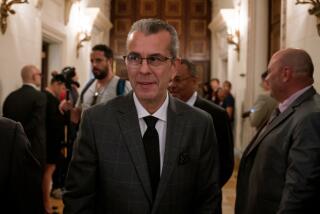‘Final’ Afghan election results announced
- Share via
Reporting from Kabul, Afghanistan — Afghanistan’s main electoral body Wednesday released what were billed as the final results of September’s trouble-plagued parliamentary election. But as is so often the case here, “final” does not mean “finished.”
Quarrels over the outcome of the vote are likely to remain a prominent feature of the country’s political landscape in the weeks or months to come, further blurring an already clouded picture.
That, in turn, raises larger questions about the conduct of the U.S.-led war, now in its 10th year, a conflict that appears to be yielding not only ambiguous battlefield results but a mixed sense among Afghans as to whether the foreign presence is doing more harm than good.
Although overall election results were released, the outcome in Ghazni, one of the country’s 34 provinces, was withheld because violence, intimidation and fraud were considered so rampant that officials decided a fair tally was impossible.
Even as the Independent Election Commission was announcing the official count, supporters of some candidates who had been disqualified days earlier by a watchdog body staged angry street demonstrations in Kabul, the capital, and elsewhere. No serious violence was reported, but simmering anger was palpable.
Meanwhile, confusion reigned over a claim by the country’s attorney general, Mohammad Ishaq Aloko — whose jurisdiction in electoral matters is altogether unclear — that he had ordered the suspension of two senior election officials while they were investigated on possible criminal charges.
At a news conference to announce the results, election officials insisted that domestic political pressure had played no role in the certified outcome.
“There might have been shortcomings, but it was a great success for the people of Afghanistan,” said Fazal Ahmad Manawi, the election commission’s chairman.
In the Sept. 18 vote, about 2,500 candidates competed for 249 seats in the Wolesi Jirga, or lower house of parliament. Over the last year, parliament has been more aggressive in challenging some of the policy decisions of Afghan President Hamid Karzai.
Election officials said they would decide soon whether to hold a do-over vote in Ghazni, where the insurgency has grown markedly stronger over the last year. According to preliminary results, the Ghazni vote had resulted in a sweep by candidates who were members of the minority Hazara ethnic group, even though the province is overwhelmingly dominated by ethnic Pashtuns.
Election observers said this suggested several possibilities: that most voters in Ghazni were too intimidated to come to the polls; that it was too dangerous to open balloting centers; or that large-scale fraud had taken place.
Western officials had hoped the parliamentary contest would help erase some of the taint of the presidential vote held 13 months earlier. Karzai ultimately emerged victorious, but nearly one-third of the ballots in the first round were tossed out due to fraud. His main rival, Abdullah Abdullah, dropped out of a runoff race, insisting that the balloting would not be fair.
Abdullah, speaking to reporters Wednesday hours after the final results from the parliamentary balloting were released, described the September vote itself as something of a mockery.
“There were not just problems in the activities of both [election] commissions, but also the government blatantly interfered in the work of these commissions,” he said.
Despite intensive Western-mentored efforts to improve voting procedures and oversight, the parliamentary election was marred by widespread voting irregularities. Thousands of fraud complaints poured in, resulting in the long delay in releasing results. Many of the allegations are still being adjudicated.
The international community’s response to Afghanistan’s latest election woes has been muted.
In the immediate aftermath of the vote, diplomats and international organizations for the most part offered congratulations to the country for managing to hold an election at all amid surging violence, and also said it would be for the Afghan people to decide whether the results were valid.
On Wednesday, similarly neutral assessments were issued by the United Nations and the American mission.
“Despite security risks … millions of men and women went to the polls and exercised their democratic right to vote,” the U.S. Embassy said in a statement.
More to Read
Sign up for Essential California
The most important California stories and recommendations in your inbox every morning.
You may occasionally receive promotional content from the Los Angeles Times.










